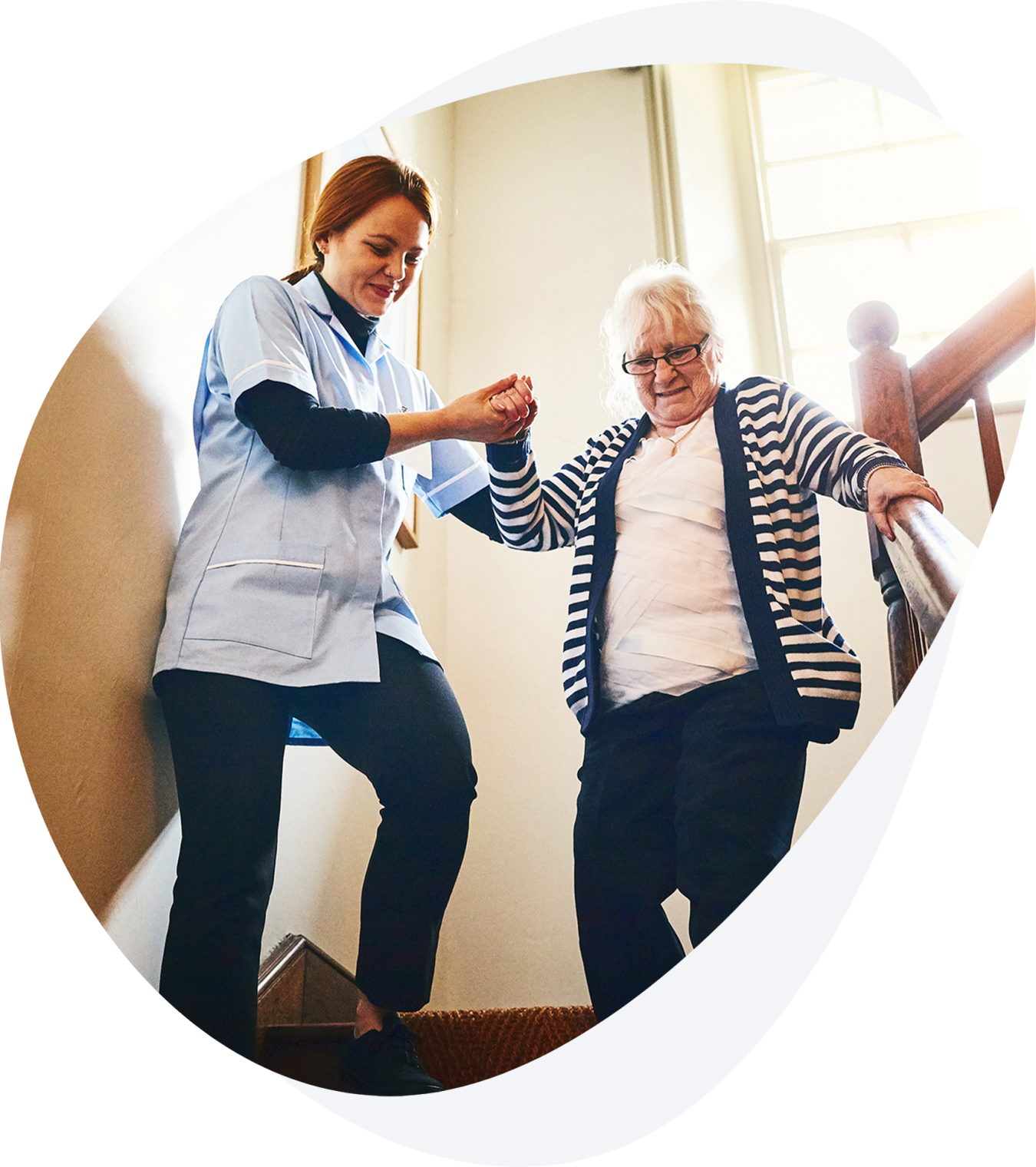OUR SERVICES
Dementia care
Living with dementia
Living with dementia can be a bewildering experience, requiring significant lifestyle changes for the whole family. At Galilee Care our specialist dementia care services can provide the essential support you need during this time. Dementia care you can rely upon. Dementia care you can trust.
We understand the emotional, social and practical challenges of living well with dementia. Gradually the world of the person with dementia and their family carers shrinks as the disease progresses. Maintaining a life outside of the home or indeed sharing the closeness you once had together can often become difficult. This together with the demands of practical care and support can leave you feeling isolated and exhausted.
Galilee Care dementia care services sensitively respond to the individual needs of you and your family. Our flexible services are tailored to fit with your chosen lifestyle so you continue to enjoy the important things in your life.
What is the difference between Alzheimer’s disease and dementia ?
People often confuse the terms ‘dementia’ and ‘Alzheimer’s disease’.
Dementia is the name given to a specific group of diseases which all cause a serious decline in the functioning of the brain. Whereas, Alzheimer’s disease refers to one specific type of dementia, and is the most common form.


Type of Dementia & Effects on the Brain
- Alzheimer’s
- Most cases of dementia care needed for older people are the result of Alzheimer’s disease
- Chemical and structural changes cause brain cells to die
- Vascular or multi- infarct dementia
- The second most common form of dementia
- The person suffers a series of strokes that prevent oxygen reaching the brain causing the brain cells to die
- Dementia with Lewy bodies
- This form of dementia is rarer, affecting only 4% of the total number of people with dementia
- Abnormal protein deposits called Lewy bodies are present in the brain. It is sometimes misdiagnosed as Parkinson’s disease because the symptoms are similar
- Fronto-temporal dementia e.g. Pick’s disease.
- Onset typically 45-65 years of age
- A build-up of abnormal proteins in the brain, leads to a progressive loss of brain cells
You may think dementia is an inevitable ’fact’ of aging. This is not true. Age does not cause dementia, although the risk does significantly increase with age. Dementia can affect younger adults as well as older people.
There are currently about 850.000 people living with dementia in the UK and this figure is expected to rise to one million by 2025. Around 17,000 people under the age of 65 years have a form of dementia. About a quarter of people between the ages of 70 and 79 years are affected and this rises to one in six for people who are over 80 years of age.
Signs and symptoms of dementia
Fronto-temporal dementia tends to affect the frontal and temporal lobes of the brain (the front and sides). We use the front of our brain for planning, organising and regulating our behaviour. So disease in this area is likely result in personality and behaviour change e.g. loss of inhibitions, becoming more impulsive or being withdrawn. Whereas, the temporal lobes organise memory and language, so disease in this area is more likely to cause difficulty communicating and remembering.
People living with dementia with Lewy bodies usually experience fluctuating cognition and recurring hallucinations.
Whilst dementia cannot be cured, the condition can be slowed down if it is caught early enough. Early diagnosis can also enable you to access the right dementia care. If you notice any of the following symptoms it is vital to seek medical help as soon as possible.
- More frequent memory loss, forgetful of familiar people, places or recent events
- Slower than usual thinking speed, difficulty finding the right words
- Periods of mental confusion
- Difficulty understanding or making decisions
- Impaired reasoning, inability to make judgements, plan or carry out tasks that require concentration
- Changes in personality or mood, disinhibited behaviour
- Increased apathy or lack of interest in their usual activities
- Withdrawn due to a loss of confidence or inability to manage everyday tasks and communication
- Hallucinations, hearing or seeing things that others don’t
- Loss of sense of time, people, places
Diagnosis
There is no precise threshold between ‘mild cognitive impairment’ such as memory loss and a clinical diagnosis of dementia. In fact dementia can only be definitely diagnosed though a post mortem examination. So the GP will begin by finding out whether the symptoms are being caused by another treatable condition such as a urinary tract or chest infection, constipation, thyroid deficiency, brain tumour, depression, emotional upheaval or a side effect of medication.
Once other causes have been eliminated the GP is likely to make a referral to a specialist such as a neuro-psychologist or psychiatrist. They may:
- Talk to the person and people who are close to them
- Use a tool to test memory and thinking (such as the Mini Mental State Examination)
- Arrange a brain scan
- Carry out a physical examination
Care and support to stay well
Lizor Care can provide experienced staff to help you maintain your quality of life while remaining in your own home. We create a specialized dementia care plan with you. This might include:
- Reminding or helping you to take your medicines to manage your symptoms
- Support with bathing and/or dressing to keep you looking your best
- Catheter care and continence management to maintain your dignity and comfort
- Help to establish a regular exercise routine to improve mood and mobility and to strengthen muscles
- Making sure you have plenty of fluids and a balanced diet with enough fresh fruit and vegetables and fibre to keep you healthy and avoid constipation
- Assisting with routine household chores and shopping so your home life is as you would like it to be
- Companionship, or helping you to be involved in social activities.
Our services provide the support and care you need to get you and your loved ones through the difficult days.
Call Us To Book An Appointment...

What Are You Waiting For...
Make an Enquire
Our location
Flat 7 Palace Court, Watling Street, Chatham, ME5 7ES
Opening Hours
Mon-Fri: 9am-5pm
Contact
Phone: 07939026817 / 07450289692
Email: galilee.care1@outlook.com